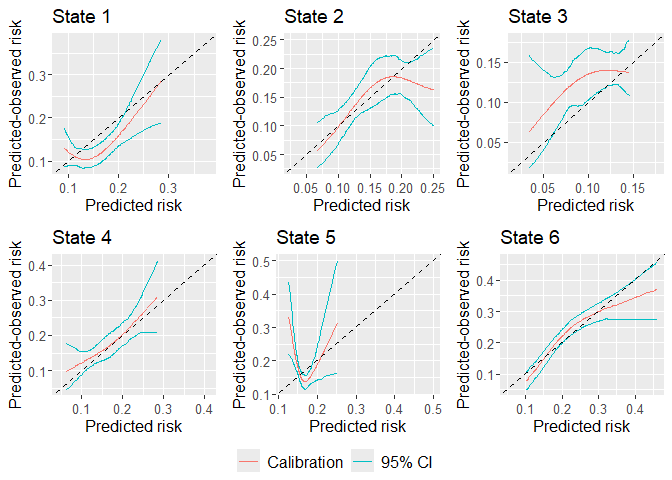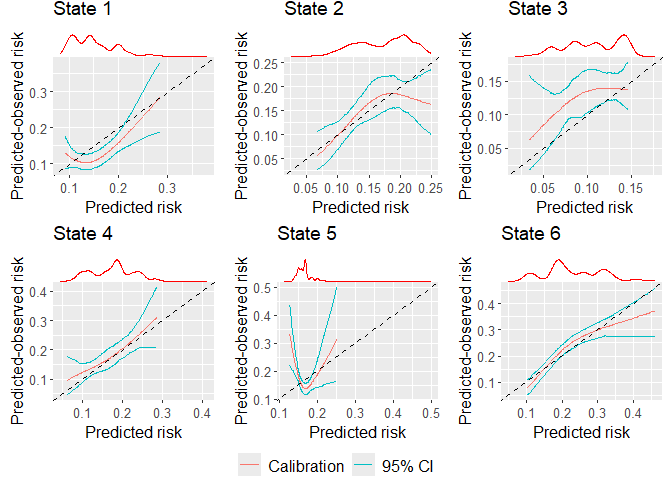The hardware and bandwidth for this mirror is donated by dogado GmbH, the Webhosting and Full Service-Cloud Provider. Check out our Wordpress Tutorial.
If you wish to report a bug, or if you are interested in having us mirror your free-software or open-source project, please feel free to contact us at mirror[@]dogado.de.
The goal of calibmsm is to provide a set of tools for estimating calibration plots when validating an existing (i.e. previously developed) multistate model. While the vignettes and articles for this package focus on assessing the calibration of a multistate model, calibration plots can also be produced for predicted risks from dynamic models, landmark super models, competing risks models and standard single outcome survival models, where predictions can be made at any landmark time.
For a detailed guide on how to use calibmsm please see the Overview vignette.
The package can be installed from CRAN as follows:
install.packages("calibmsm")You can install the development version of calibmsm from GitHub with:
# install.packages("devtools")
devtools::install_github("alexpate30/calibmsm")This is a basic example which shows you how to assess the calibration
of the transition probabilities at 5 years follow up for individuals out
of state j = 1 at time s = 0 using the
BLR-IPCW approach. Please see the Overview vignette for
examples of how to assess calibration using the pseudo-value and
MLR-IPCW approaches, as well as details of the methodology.
The predicted transition probabilities are stored in
tps0, the individuals data are stored in
ebmtcal, and the data in msdata format are
stored in msebmtcal. Calibration curves are estimated using
calib_msm using the BLR-IPCW method
(calib.type = 'blr') with inverse probability of censoring
weights are calculated based on variables year,
age, prophylaxis and donor gender
match. The calibration curves are estimated using
restricted cubic splines with 3 knots. A 95% confidence interval is
calculated using bootstrapping with 200 bootstrap replicates.
## Load calibmsm
library(calibmsm)
## Extract relevant predicted risks from tps0
tp_pred_s0 <- dplyr::select(dplyr::filter(tps0, j == 1), any_of(paste("pstate", 1:6, sep = "")))
## Calculate observed event probabilities
dat_calib_blr <-
calib_msm(data_ms = msebmtcal,
data_raw = ebmtcal,
j = 1,
s = 0,
t = 1826,
tp_pred = tp_pred_s0,
calib_type = "blr",
curve_type = "rcs",
rcs_nk = 3,
w_covs = c("year", "agecl", "proph", "match"),
CI = 95,
CI_R_boot = 200)We can then plot the calibration plots:
plot(dat_calib_blr, combine = TRUE, nrow = 2, ncol = 3, axis.titles.x = c(4,5,6), axis.titles.y = c(1,4), marg_density = FALSE)
If wanting to include marginal density plots (recommended, also the default) then the output is a gTable, that must then in turn be plotted, i.e:
marg_density_plot <- plot(dat_calib_blr, combine = TRUE, nrow = 2, ncol = 3, axis.titles.x = c(4,5,6), axis.titles.y = c(1,4))
plot(marg_density_plot)
At this step plot can also be replcaed by
grid::grid.draw.
If you encounter a bug, please file an issue with a minimal reproducible example on GitHub.
These binaries (installable software) and packages are in development.
They may not be fully stable and should be used with caution. We make no claims about them.
Health stats visible at Monitor.